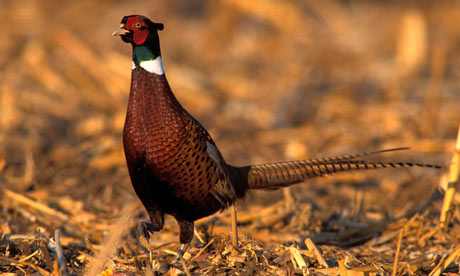
Pregnant women and children have been warned against eating game such as pheasant, deer and grouse killed with lead shot because it could pose a serious risk to their health.
In an official statement released on Monday, the Food Standards Agency (FSA) said that everyone who ate lead-shot game regularly should cut down on it because it was potentially toxic.
Dr Alison Gleadle, the agency's director of food safety, said that advice was "especially important" for pregnant women, toddlers, children and women trying for a baby as exposure "can harm the developing brain and nervous system".
The FSA said people who regularly ate small wild game birds shot with lead, such as grouse, pheasant, duck and partridge, faced significant exposure risks if they ate more than 100g (3.5oz) a week. Cooking those game birds in acidic liquids such as wine, vinegar or tomato juice made lead dissolve, and easier for humans to absorb.
Much larger animals, such as deer, would have lower concentrations of lead. The agency said eating one 120g portion a week was "less of a concern for adults". Most game sold in supermarkets was safe to eat, it stressed, as it was more likely to have been farmed and safely killed.
The release of the FSA's advice follows a row last week after its expected publication last Wednesday was delayed following disputes in its expert advising panel, the lead ammunition group, over the terms and extent of the warning.
The Wildfowl and Wetland Trust (WWT) has been at the forefront of campaigns against lead shot. Its analysis showed lead shot was to blame for poisoning thousands of waterbirds.
It alleges that up to 70% of duck in the UK has been shot using lead, in breach of a ban in 1999, and has published reports on the growing amount of scientific and medical evidence about the risk of eating lead-shot game.
The British Association of Conservation and Shooting (BASC), whose director, John Swift, chaired the lead ammunition panel, had insisted that the agency publish a risk assessment with its formal warning.
Christopher Graffius, head of communications for the BASC, said the risks of eating lead-shot game "should not be exaggerated" and insisted it posed a minimal risk to consumers. He said that "pound for pound", chocolate had more lead in it than game.
"There is lead in all foodstuffs and we should see the purported risk of lead in game meat in a sensible perspective," Graffius said. "There is no evidence of harm to those of us who eat game less than once every week. Compared with other meats wild game is low in fats and entirely natural, representing a healthy option to intensively reared products."
Dr Deborah Pain, director of conservation at the WWT and a member of the lead ammunition panel, said she hoped the FSA's advice would accelerate action against the use of all lead shot.
"Lead is toxic and concerns for human health add to the already strong argument for replacing lead with non-toxic shot, which has long been available, for all shooting. We were pleased to see that the FSA had published their human health advice," she said.

